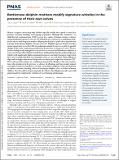Bottlenose dolphin mothers modify signature whistles in the presence of their own calves
Abstract
Human caregivers interacting with children typically modify their speech in ways that promote attention, bonding, and language acquisition. Although this “motherese,” or child-directed communication (CDC), occurs in a variety of human cultures, evidence among nonhuman species is very rare. We looked for its occurrence in a nonhuman mammalian species with long-term mother–offspring bonds that is capable of vocal production learning, the bottlenose dolphin (Tursiops truncatus). Dolphin signature whistles provide a unique opportunity to test for CDC in nonhuman animals, because we are able to quantify changes in the same vocalizations produced in the presence or absence of calves. We analyzed recordings made during brief catch-and-release events of wild bottlenose dolphins in waters near Sarasota Bay, Florida, United States, and found that females produced signature whistles with significantly higher maximum frequencies and wider frequency ranges when they were recorded with their own dependent calves vs. not with them. These differences align with the higher fundamental frequencies and wider pitch ranges seen in human CDC. Our results provide evidence in a nonhuman mammal for changes in the same vocalizations when produced in the presence vs. absence of offspring, and thus strongly support convergent evolution of motherese, or CDC, in bottlenose dolphins. CDC may function to enhance attention, bonding, and vocal learning in dolphin calves, as it does in human children. Our data add to the growing body of evidence that dolphins provide a powerful animal model for studying the evolution of vocal learning and language.
Citation
Sayigh , L S , El Haddad , N , Tyack , P L , Janik , V M , Wells , R S & Jensen , F H 2023 , ' Bottlenose dolphin mothers modify signature whistles in the presence of their own calves ' , Proceedings of the National Academy of Sciences , vol. 120 , no. 27 , e2300262120 . https://doi.org/10.1073/pnas.2300262120
Publication
Proceedings of the National Academy of Sciences
Status
Peer reviewed
ISSN
1091-6490Type
Journal article
Description
Funding: PLT received support from ONR grants N00014-18-1-2062 and N00014-20-1-2709. Financial support for the whistle database project has come from the Protect Wild Dolphins fund at Harbor Branch Oceanographic Institute, Vulcan Machine Learning Center for Impact, Allen Institute for Artificial Intelligence, Adelaide M. & Charles B. Link Foundation, and Dolphin Quest, Inc.Collections
Items in the St Andrews Research Repository are protected by copyright, with all rights reserved, unless otherwise indicated.

